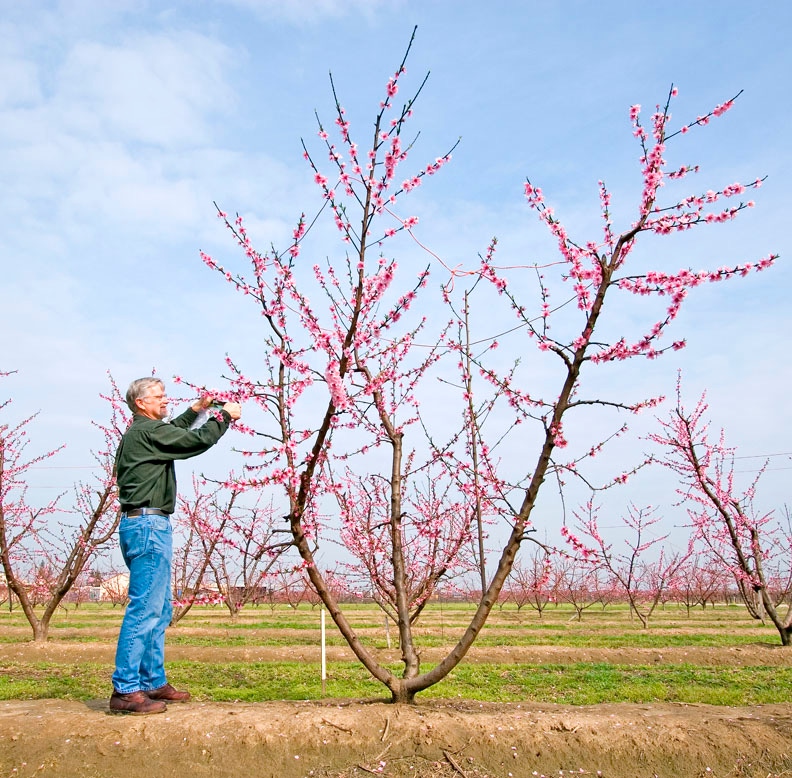
UC Davis course helps answer need for pomology education
As fruit and nut production grows throughout California, a vital element to that growth is shrinking: pomology education. “With all the cutbacks in California, there are fewer horticulture teachers, fewer farm advisors and fewer ways for farmers to get good information. Our region is so productive for almonds, pistachios, citrus, cherries, peaches, nectarines—you name it—but growers don’t always have the knowledge they need.”
November 2, 2012

As fruit and nut production grows throughout California, a vital element to that growth is shrinking: pomology education.
“It’s a huge problem,” says Tim Gerdts with Burchell Nursery in Fresno, a salesman who specializes in helping growers buy and manage fruit and nut trees. “With all the cutbacks in California, there are fewer horticulture teachers, fewer farm advisors and fewer ways for farmers to get good information. Our region is so productive for almonds, pistachios, citrus, cherries, peaches, nectarines—you name it—but growers don’t always have the knowledge they need.”
Burchell and others say a new two-week pomology short course offered by UC Cooperative Extension fruit and nut experts and University of California, Davis Department of Plant Sciences faculty will help fill that gap, providing the fundamentals of tree biology essential to making smart orchard management and business decisions.
The short course will be held Feb. 25 through March 7, 2013, at the UC Davis Conference Center, led by a team of experts including Ted DeJong, a longtime plant physiology professor in the plant sciences department and extension pomologist.
“Most courses like this focus on tree-crop management practices, telling you what to do and when to do it,” DeJong says. “I like to start by developing an integrated understanding of how trees grow and function and then students and growers understand why they do what they do when they do it. When they understand what causes a plant stress, for example, they make decisions accordingly. And they are better able to diagnose problems.”
Farmers, orchard managers and students will all benefit from the course and from DeJong’s approach, says Gerdts, the son of Marvin Gerdts, a former Cooperative Extension pomologist based at the UC Kearney Agricultural Research and Extension Center in Parlier, Calif.
“When I started at Burchell Nursery 27 years ago, there were farm advisors throughout the state who could teach pruning and answer farmers’ questions,” Tim Gerdts says. “Now, the few farm advisors who specialize in tree crops are stretched so thin. And for years, the California Tree Fruit Agreement arranged for Ted DeJong to come to Fresno and teach classes on stone-fruit tree physiology and practices. But that program was voted out, so those classes are gone, too.”
Gerdts has occasionally joined with Bob Beede, a UC Cooperative Extension farm advisor from Kings County, to teach pruning and other orchard-management practices to growers in the Central Valley.
“But that only goes so far,” Gerdts says. “The need for good information is huge. I see it all the time in my line of work — not only the lack of information among fruit and nut growers but the misinformation.”
Mistakes costly
Misinformation is especially troublesome for tree crops, DeJong says, because mistakes you make today can have lasting effects.
“With annual crops, you can learn from your mistakes and start over fresh each year,” DeJong says. “Trees are long-lived, and there are carryover effects. What happens during this year’s crop will affect next year’s crop. That’s why it’s so important to understand the underpinnings of how trees grow.”
The course might seem pricey — $2,850 for the two weeks — but not when compared it to the cost of a university pomology education.
“To our knowledge, there is no comparable extension course in the United States that provides instruction by faculty researchers and Cooperative Extension specialists on the fundamentals of fruit and nut tree growth and development that underpin orchard management practices,” says DeJong. “Our goal is to provide access to practical, UC Davis pomology education in a shorter time frame, and reduced cost, than is currently available through traditional university classes.”
Participants will receive a certificate for taking the course. The first week will include lectures, hands-on exercises and field demonstrations in basic tree biology and orchard management practices.
During the second week, students and instructors will embark on a four-day tour in fruit- and nut-growing regions of Northern and Central California. The field tour includes stops at commercial nurseries, packinghouses, retail outlets, experimental plots and private orchards. Participants will see field demonstrations at the UC Kearney Agricultural Research and Extension Center in Parlier and the Nickels Soil Laboratory in Arbuckle.
In addition to DeJong, instructors include Vito Polito, plant sciences at UC Davis; Kevin Day, UC Cooperative Extension farm advisor in Tulare County; R. Scott Johnson, UC Cooperative Extension specialist in the plant sciences department based at Kearney; and Carlos Crisosto, UC Cooperative Extension specialist in the department who specializes in postharvest physiology.
Lecture topics include:
The basics of how trees work
Ideal climatic and soil conditions for tree fruit and nut crops
Dormancy, chill requirements and rest breaking
How trees grow and what determines architecture
Understanding cropping, pollination and fruit set
How trees use water and nutrients
Fruit growth and development
Harvest and harvest indices
Postharvest quality and technology
Hands-on exercises and field demonstrations include:
Bearing habits
Measuring fruit quality and fruit tasting
Pruning, training and light management
Root excavations
Budding and grafting
Measurement of plant water status and irrigation scheduling
Measurement of plant nutrient status and fertilization scheduling
Details and registration information are available at http://fruitandnuteducation.ucdavis.edu.
For more information, contact Brooke Jacobs at (530) 754-9708 or [email protected].
You May Also Like



